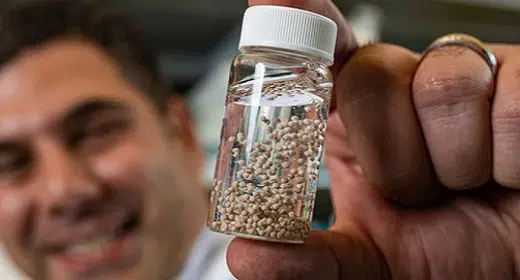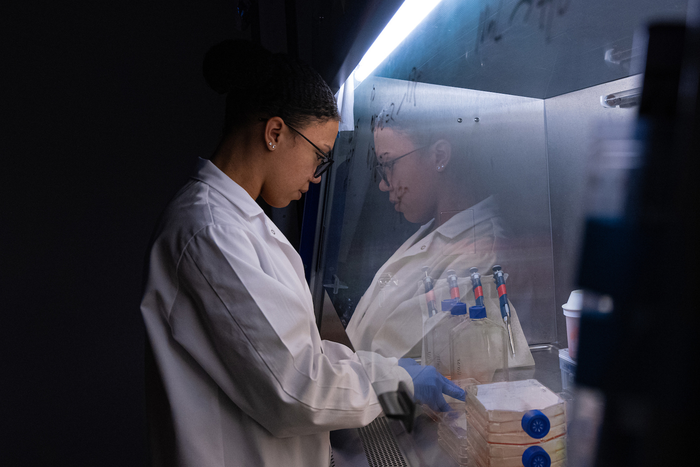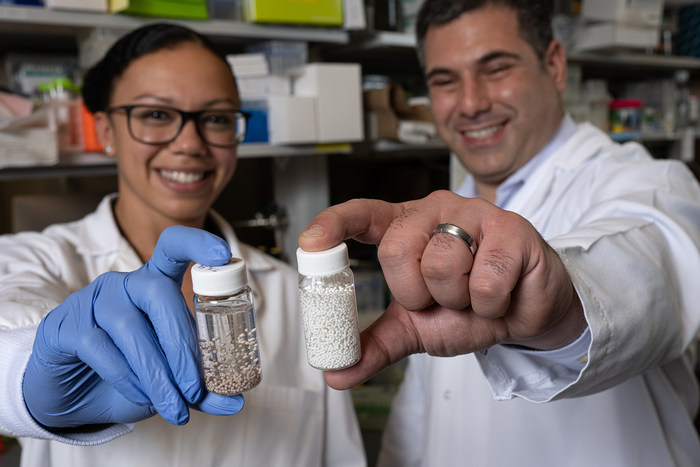by Nick Lavars: Among the many challenges in treating tumors is the difficulty in getting anti-cancer drugs to the right locations, and in the right amounts…
A new type of implant developed at Rice University tackles both these issues, carrying the cellular machinery needed to produce and deliver continuous doses of anti-cancer compounds, and doing so with such potency that they took out 100 percent of ovarian tumors in mice in the space of a week.
The bioengineers behind this promising new form of immunotherapy treatment for cancer describe it as a “drug factory,” in that once it is in place, it can go on generating the compounds needed to take out tumors all on its own. The implants consist of tiny beads the size of a pinhead, which are packed with carefully selected cells and encased within a protective shell.
The cells inside these beads are engineered to produce a natural compound called interleukin-2, a cytokine that causes white blood cells to spring into action to fight cancer. These beads were first put to the test in laboratory experiments that placed them alongside tumors within a peritoneum, a membrane that forms the lining of the abdominal cavity. Here, the drug factories were shown to selectively generate a concentration of interleukin-2 within the tumors, with little to be seen elsewhere.
Experiments on mouse models of advanced ovarian cancer and colorectal cancer then followed. The beads again performed exceptionally well, eradicating tumors in the rodents in as little as six days. Importantly, they only delivered high concentrations of the drugs at the tumor site and limited exposure elsewhere, avoiding the risk of toxicity to healthy cells.
“We just administer once, but the drug factories keep making the dose every day, where it’s needed until the cancer is eliminated,” said Omid Veiseh, an assistant professor of bioengineering. “Once we determined the correct dose – how many factories we needed – we were able to eradicate tumors in 100 percent of animals with ovarian cancer and in seven of eight animals with colorectal cancer.”
The protective shell plays an important role in the function of the drug factories, and not just in keeping their contents safe. This casing is made of materials that the immune system recognizes as foreign, but only as a threat that needs to be dealt with after a certain period of time. This ensures the treatment doesn’t continue indefinitely.
“We found foreign body reactions safely and robustly turned off the flow of cytokine from the capsules within 30 days,” said Veiseh. “We also showed we could safely administer a second course of treatment should it become necessary in the clinic.”
When setting out to design these drug factories, the scientists were careful to use only components that had already been proven as safe for use in the human body. Interleukin-2 is also an FDA-approved treatment for cancer, and the team says this new technology is capable of inducing a stronger immune response than existing treatments due to its ability to deliver high concentrations directly to tumor sites.
“In this study, we demonstrated that the ‘drug factories’ allow regulatable local administration of interleukin-2 and eradication of tumor in several mouse models, which is very exciting,” said study co-author Dr. Amir Jazaeri. “This provides a strong rationale for clinical testing.”
According to the team, the technology could be adapted to use against other cancers by packing the beads with different cell types to induce different immune responses. They say the treatment could be ready for human clinical trials later in 2022.











































